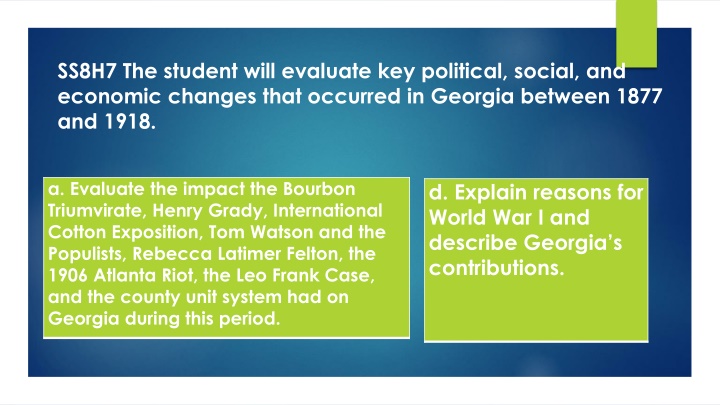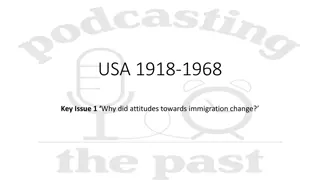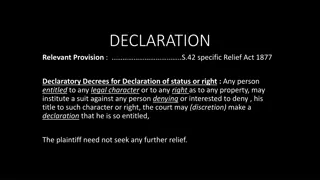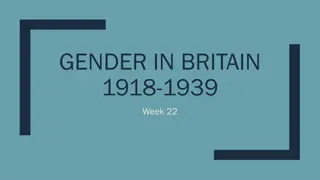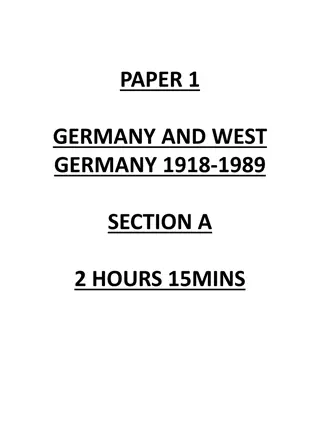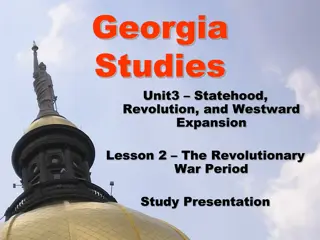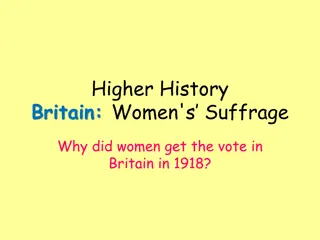Key Political, Social, and Economic Changes in Georgia (1877-1918)
Evaluate the significant impact of key historical events and figures in Georgia between 1877 and 1918, such as the Bourbon Triumvirate, Henry Grady, International Cotton Exposition, Tom Watson and the Populists, Rebecca Latimer Felton, the Atlanta Riot of 1906, the Leo Frank Case, and the County Unit System. Additionally, explore the reasons behind World War I and Georgia's contributions to the war effort.
Download Presentation

Please find below an Image/Link to download the presentation.
The content on the website is provided AS IS for your information and personal use only. It may not be sold, licensed, or shared on other websites without obtaining consent from the author.If you encounter any issues during the download, it is possible that the publisher has removed the file from their server.
You are allowed to download the files provided on this website for personal or commercial use, subject to the condition that they are used lawfully. All files are the property of their respective owners.
The content on the website is provided AS IS for your information and personal use only. It may not be sold, licensed, or shared on other websites without obtaining consent from the author.
E N D
Presentation Transcript
SS8H7 The student will evaluate key political, social, and economic changes that occurred in Georgia between 1877 and 1918. a. Evaluate the impact the Bourbon Triumvirate, Henry Grady, International Cotton Exposition, Tom Watson and the Populists, Rebecca Latimer Felton, the 1906 Atlanta Riot, the Leo Frank Case, and the county unit system had on Georgia during this period. d. Explain reasons for World War I and describe Georgia s contributions.
The County Unit System was instituted in 1917 gave more power to rural, less populated counties counties were divided into three categories given a specific number of unit votes 8 Urban counties were given 6 votes each 30 town counties were given 4 votes each 121 rural counties were given 2 votes each
The County Unit System When rural counties voted as a block, they had much more power than the more populous urban centers. going against the concept of one man, one vote this system lasted for almost 50 years along with the white primary, this tactic was also used to limit the voting power of African-Americans, who migrated to towns and urban counties
The County Unit System Georgia was a solidly Democratic state candidates who won the primary were guaranteed to win the election
The Reasons for World War I Nationalism Colonization Militarism the alliance system All of these factors came to a head with the assassination of Archduke Franz Ferdinand the heir to the throne of Austria-Hungary Killed by Yugoslavian nationalist
M- Militarism A- Alliances N- Nationalism I- Imperialism A- Assignation of Arch Duke Ferdinand
The Reasons for World War I Believing that the Kingdom of Serbia was involved in the assassination, Austria-Hungary invaded the country Russia came to Serbia s aid This led to Germany and the Ottoman Empire coming into the war on the side of Austria-Hungary with France England siding with Russia The war lasted for four years (1914-1918) and resulted in the death of millions throughout Europe.
The Reasons for World War I United States did not become involved in the war until 1917 Though angered by the sinking of the passenger ship Lusitania by a German submarine in 1915 the last straw was the Zimmerman Telegram This German message was sent to Mexico offering the country a chance to ally with Germany and attack the United States In return Germany promise the return of the territories that Mexico lost to the United States during the Mexican- American War
The Reasons for World War I Upon discovering this telegram, the United States declared war on Germany on April 6, 1917
Georgias Contributions During World War I providing more military training camps than any other states Fort McPherson, Camp Gordon, Camp Benning, and Camp Stewart over 100,000 Georgians took part in the war effort many of Georgia s non-combatants bought war bonds and grew victory gardens to help supply the troops
